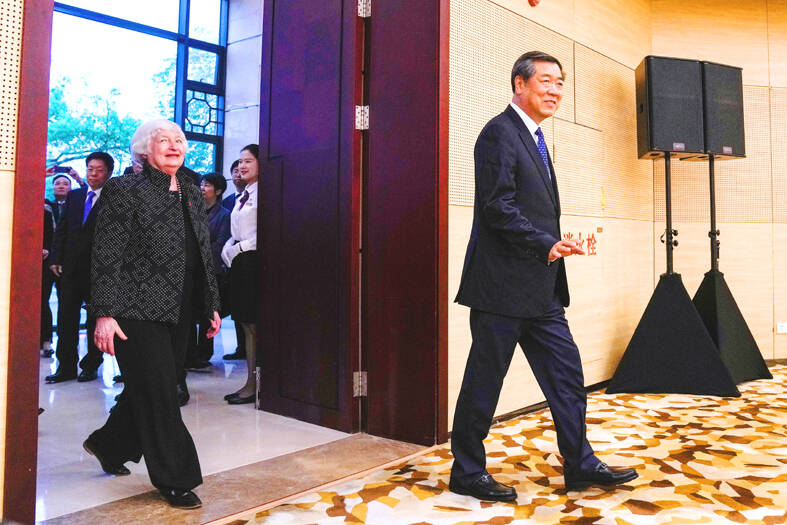US Secretary of the Treasury Janet Yellen yesterday warned during a visit to China that Beijing’s subsidies for industry could pose a risk to global economic resilience.
Yellen arrived in Guangzhou on Thursday for several days of talks with Chinese officials on her second visit to the world’s second-largest economy in less than a year.
She expressed concerns about China’s “overcapacity” undercutting companies in the US and elsewhere.

Photo: EPA-EFE
Such overcapacity is seen as a result of huge Chinese subsidies to industries, such as solar, electric vehicles (EV) and batteries, that risk creating a surplus of cheap goods that threatens those sectors elsewhere.
“Direct and indirect government support is currently leading to production capacity that significantly exceeds China’s domestic demand, as well as what the global market can bear,” she told a gathering of the US business community. “Overcapacity can lead to large volumes of exports at depressed prices and it can lead to overconcentration of supply chains, posing a risk to global economic resilience.”
Such fears are not part of an “anti-China policy,” she said during a question-and-answer session after the speech, but are intended to mitigate risks from “inevitable global economic dislocation that will result” from no change in Chinese policies.
Yellen also told the gathering, organized by the US Chamber of Commerce in China, that she would seek to raise with Chinese officials the “challenges” faced by US businesses operating in the country.
That included Beijing “imposing barriers to access for foreign firms and taking coercive actions against American companies,” she said.
“This doesn’t only hurt these American firms. Ending these unfair practices would benefit China by improving the business climate here,” Yellen said.
Yellen then met with Chinese Vice Premier He Lifeng (何立峰), who said he looked forward to “further in-depth discussions on important issues to China, the United States and the global economic and financial arena.”
He also said they would seek to “provide appropriate responses to key concerns in China-US economic relations.”
“It is hoped that both sides will achieve new mutually beneficial and win-win outcomes,” he added.
The two sides then began closed-door talks, which the US has said would see the two dive deep into both countries’ economic situations as well as address more sensitive areas such as national security and Beijing’s alleged support for Russia’s defense industrial base.
Yellen in the morning told the governor of Guangdong that the US was committed to a “healthy economic relationship.”
However, that required “a level playing field for American workers and firms,” she added.
Beijing has dismissed concerns over its state support for industry, last month condemning an EU probe into its subsidies for EVs as “protectionism” and part of a Western effort to politicize international trade.
Washington’s worries about a flood of exports come as US President Joe Biden pushes to boost domestic manufacturing in clean energy, with policymakers warning that China’s excess capacity could harm the growth of those industries.

Semiconductor business between Taiwan and the US is a “win-win” model for both sides given the high level of complementarity, the government said yesterday responding to tariff threats from US President Donald Trump. Home to the world’s largest contract chipmaker, Taiwan Semiconductor Manufacturing Co (TSMC, 台積電), Taiwan is a key link in the global technology supply chain for companies such as Apple Inc and Nvidia Corp. Trump said on Monday he plans to impose tariffs on imported chips, pharmaceuticals and steel in an effort to get the producers to make them in the US. “Taiwan and the US semiconductor and other technology industries

CHIP WAR: Tariffs on Taiwanese chips would prompt companies to move their factories, but not necessarily to the US, unleashing a ‘global cross-sector tariff war’ US President Donald Trump would “shoot himself in the foot” if he follows through on his recent pledge to impose higher tariffs on Taiwanese and other foreign semiconductors entering the US, analysts said. Trump’s plans to raise tariffs on chips manufactured in Taiwan to as high as 100 percent would backfire, macroeconomist Henry Wu (吳嘉隆) said. He would “shoot himself in the foot,” Wu said on Saturday, as such economic measures would lead Taiwanese chip suppliers to pass on additional costs to their US clients and consumers, and ultimately cause another wave of inflation. Trump has claimed that Taiwan took up to

A start-up in Mexico is trying to help get a handle on one coastal city’s plastic waste problem by converting it into gasoline, diesel and other fuels. With less than 10 percent of the world’s plastics being recycled, Petgas’ idea is that rather than letting discarded plastic become waste, it can become productive again as fuel. Petgas developed a machine in the port city of Boca del Rio that uses pyrolysis, a thermodynamic process that heats plastics in the absence of oxygen, breaking it down to produce gasoline, diesel, kerosene, paraffin and coke. Petgas chief technology officer Carlos Parraguirre Diaz said that in

Japan intends to closely monitor the impact on its currency of US President Donald Trump’s new tariffs and is worried about the international fallout from the trade imposts, Japanese Minister of Finance Katsunobu Kato said. “We need to carefully see how the exchange rate and other factors will be affected and what form US monetary policy will take in the future,” Kato said yesterday in an interview with Fuji Television. Japan is very concerned about how the tariffs might impact the global economy, he added. Kato spoke as nations and firms brace for potential repercussions after Trump unleashed the first salvo of